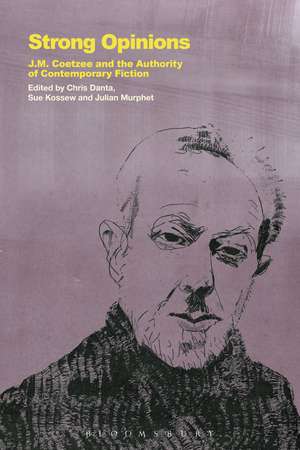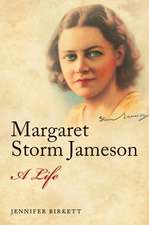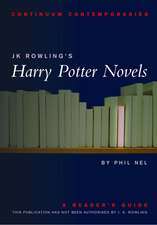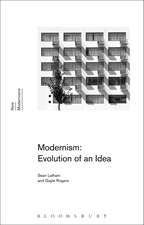Strong Opinions: J.M. Coetzee and the Authority of Contemporary Fiction
Editat de Dr. Chris Danta, Sue Kossew, Julian Murpheten Limba Engleză Paperback – 22 mai 2013
| Toate formatele și edițiile | Preț | Express |
|---|---|---|
| Paperback (1) | 255.58 lei 6-8 săpt. | |
| Bloomsbury Publishing – 22 mai 2013 | 255.58 lei 6-8 săpt. | |
| Hardback (1) | 830.87 lei 6-8 săpt. | |
| Bloomsbury Publishing – 14 sep 2011 | 830.87 lei 6-8 săpt. |
Preț: 255.58 lei
Nou
Puncte Express: 383
Preț estimativ în valută:
48.91€ • 51.23$ • 40.53£
48.91€ • 51.23$ • 40.53£
Carte tipărită la comandă
Livrare economică 08-22 aprilie
Preluare comenzi: 021 569.72.76
Specificații
ISBN-13: 9781623569587
ISBN-10: 1623569583
Pagini: 192
Ilustrații: black & white illustrations
Dimensiuni: 156 x 234 x 10 mm
Greutate: 0.27 kg
Editura: Bloomsbury Publishing
Colecția Bloomsbury Academic
Locul publicării:New York, United States
ISBN-10: 1623569583
Pagini: 192
Ilustrații: black & white illustrations
Dimensiuni: 156 x 234 x 10 mm
Greutate: 0.27 kg
Editura: Bloomsbury Publishing
Colecția Bloomsbury Academic
Locul publicării:New York, United States
Caracteristici
Illustrates the centrality of Coetzee to contemporary literary theory and practice
Notă biografică
Chris Danta is Senior Lecturer in English in the School of English, Media and Performing Arts at the University of New South Wales. He has published essays in New Literary History, Textual Practice, Modernism/Modernity, Sub-Stance and Literature and Theology. Sue Kossew is Professor of English at Monash University, Australia. Her publications include Pen and Power: A Post-colonial Reading of J. M. Coetzee and André Brink (1996), Critical Essays on J. M. Coetzee (1998), Re-Imagining Africa: New Critical Perspectives (Nova Science, 2001, co-edited with Dianne Schwerdt) and Writing Woman, Writing Place: Australian and South African Fiction (2004). Julian Murphet is Professor of Modern Film and Literature at the University of New South Wales, Australia. He is the author of Multimedia Modernism (2009), Literature and Race in Los Angeles (2001), co-author of Narrative and Media (2005), and co-editor of Literature and Visual Technologies (2003).
Cuprins
AcknowledgementsContributorsIntroductionJ.M. Coetzee: the Janus Face of Authority Chris DantaPart One: Place1. J.M. Coetzee's Australian Realism Elleke Boehmer2. "[I]n Australia you start zero": the Escape from Place in J.M. Coetzee's Late NovelsMelinda Harvey3. J.M. Coetzee and Patrick White: Explorers, Settlers, GuestsMaria LópezPart Two: Form4. Coetzee's OpinonsPaul Patton5. Diary of a Bad Year: Parrhesia, Opinion, and Novelistic FormJulian Murphet6. Realism and Intertextuality in Coetzee's FoeAnthony UhlmannPart Three: Limits7. The Trope of Following in J. M. Coetzee's Slow ManMike Marais8. Literary Migration: Shifting Borders in Coetzee's Australian NovelsSue Kossew9. The Melancholy Ape: Coetzee's Fables of Animal FinitudeChris Danta10. Silence as Heterotopia in Coetzee's FictionBill AshcroftBibliographyIndex
Recenzii
A clearly focussed and helpful contribution to the demanding and as yet barely embarked-upon task of coming to terms with Coetzee's most recent writings.
The essays in Strong Opinions, written by some of the top scholars in the field of Coetzee studies, work in productive ways to examine how Coetzee's writing, particularly his post-apartheid and Australia-era works, perform a position that not only questions the role of literature as authority but also deconstruct the very idea that literary authority is possible. These essays call to attention Coetzee's explicitly self-conscious act of story telling as his works navigate and negotiate specific locales, both literal and figurative. And this collection, like the works that it examines, astutely pushes the limits of what literature and literary analysis can do and asks that we, as readers, explore a tenuous duality in Coetzee's fiction: the public duty of the writer to his audience and the private- and perhaps transcendent-duty of the artist to his conscience.
The essays in Strong Opinions, written by some of the top scholars in the field of Coetzee studies, work in productive ways to examine how Coetzee's writing, particularly his post-apartheid and Australia-era works, perform a position that not only questions the role of literature as authority but also deconstruct the very idea that literary authority is possible. These essays call to attention Coetzee's explicitly self-conscious act of story telling as his works navigate and negotiate specific locales, both literal and figurative. And this collection, like the works that it examines, astutely pushes the limits of what literature and literary analysis can do and asks that we, as readers, explore a tenuous duality in Coetzee's fiction: the public duty of the writer to his audience and the private- and perhaps transcendent-duty of the artist to his conscience.















